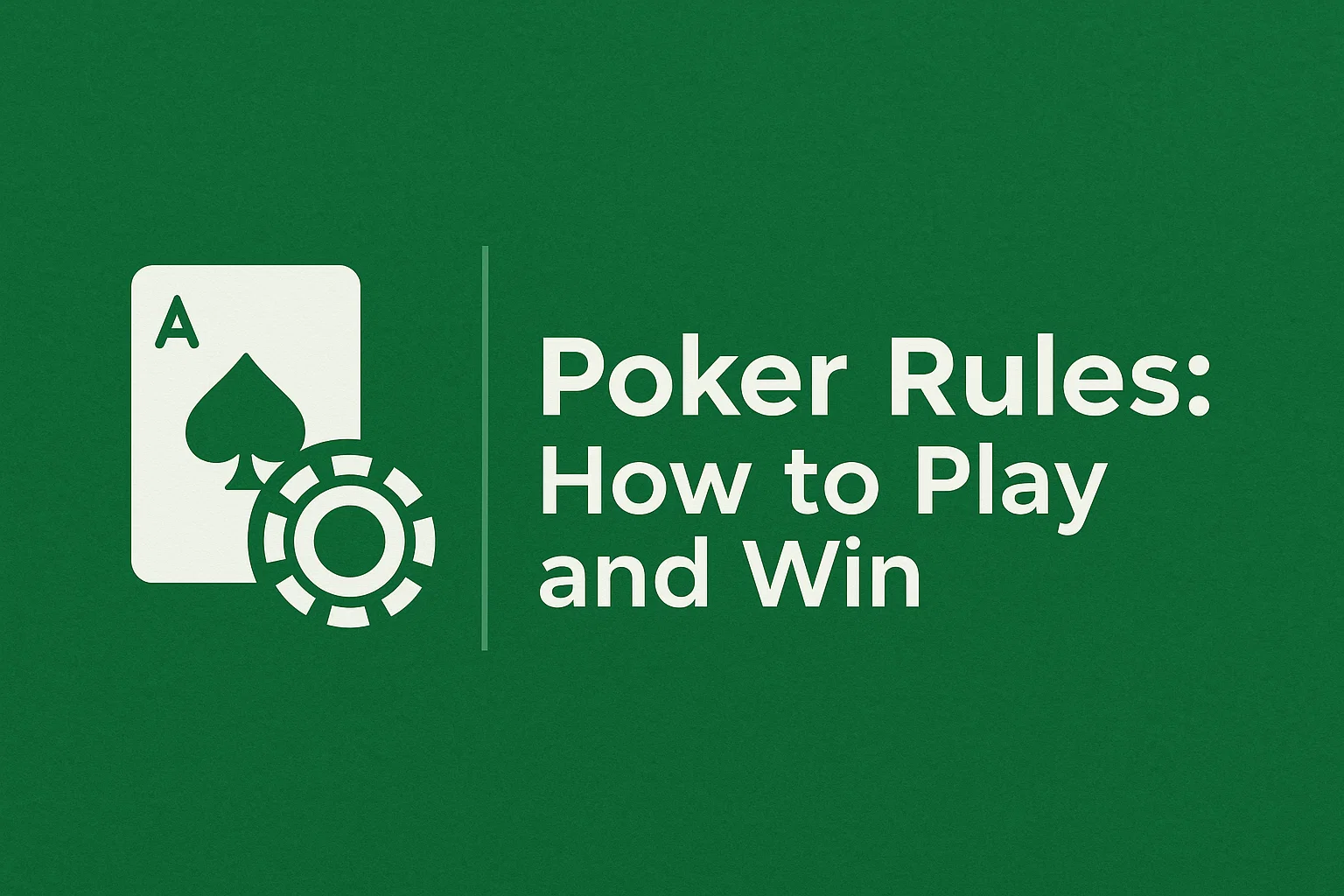Poker Rules: How to Play and Win

Yes, it's that card game that nearly everyone's familiar with. But remarkably few know the intricacy and strategy of poker. And perhaps that's a wasted opportunity! Because when you do start to learn about the rules and mechanics, you find out poker's not a game of fortune — it's a battle of brains. Every decision is like a chess move, and every bet is an exercise in patience, nerves, and reading people.
Poker is not a game of luck. It's a complicated dance of risk, odds, and careful long-term planning. For some Kiwis, it's gritty play. For others, it's cold logical thinking. Regardless of style, though, all old hands will attest to: psychology and reading people is essential. If you're ready to prove your mettle, search for top sites with online poker NZ real money games — where strategy and real stakes collide.
With television coverage like the World Series of Poker (WSOP), the game has reached New Zealand living rooms in their millions. Most dream of going pro and modeling themselves on poker heroes. And then there's the money — better players enjoy prestige, respect, and a place in poker history.
In this tutorial, we'll walk you through the fundamentals — from flat hands to low-stakes betting techniques. You'll learn how to play poker, how betting circles function, and why your table position matters. We'll cover the mind games involved in the game, including bluffing and reading tells, and conclude with expert tips from seasoned players. So put the kettle on and get comfortable — let's begin.
Poker Hands: Weakest to Strongest Ranked
To become good at poker, you need to know your hands. This is the weakest to strongest ranked list:
- High Card – Five individual cards of mixed suits and ranks. The lowest rated hand.
- Pair – Two of the same value (two sixes). Moderately weak but can end up stronger.
- Two Pairs – Two different pairs, for example, two eights and two threes. Good foundation for a mid-range play.
- Three of a Kind – Three of the same cards (like three jacks). Aggressive hand, but not unbreakable.
- Straight – Five cards in sequence (for example, 5-6-7-8-9), regardless of suit.
- Flush – Five of the same cards, not in order. Powerful hand that usually wins unless picked up.
- Full House – A mix of three of a kind and a pair (such as three kings and two nines). Very strong.
- Four of a Kind – Four cards of the same rank (such as four tens). Strong in most games.
- Straight Flush – Five sequential cards of the same suit. A rare and powerful hand.
- Royal Flush – Best hand: 10, J, Q, K, A of the same suit. Extremely uncommon but unbeatable.
It is vital to master hand rankings in order to succeed at poker. Knowing them allows you to approximate your chances and make an educated guess about what the other players might have.
The Basic Rules of Poker
Poker is usually played with a standard 52-card deck. Each player is dealt a hand, and depending on the variation, the rules and amount of cards may vary. But the goal remains the same: make the best hand or bluff others out by betting.
Gameplay is structured in a sequence of betting rounds. Individuals bet, raise, or fold based on the certainty they have in their hand. Here's a broad outline:
- Cards are dealt
- Players bet or fold
- Cards are revealed (showdown) to determine the winner
Blinds
Two individuals post obligatory bets known as blinds ahead of the cards being dealt to ensure there's always something in the pot:
- Small Blind (SB) – Half of the big blind.
- Big Blind (BB) – The minimum bet.
In a $1/$2 game, the small blind is $1 and the big blind is $2.
Community Cards
In New Zealand's most popular Texas Hold'em poker game, players each have two secret cards and five community cards of a group:
- The Flop – Three are dealt face-up.
- The Turn – A fourth is placed.
- The River – The final, fifth, card is revealed.
You use these cards in combination with your two hole cards to build the best possible five-card hand.
Betting Rounds and Betting Types
Betting is the soul of poker. Even with weak hands, smart betting can lead to victory. Here are the main betting actions:
- Bet – Place chips in the pot.
- Call – Match the current highest bet.
- Raise – Increase the size of the existing bet.
- Reraise (3-bet) – Raise a previous raise.
- Check – Stay in the game without betting.
- Check-Raise – Check, raise after an opponent's bet.
- All-In – Bet all of your chips.
- Fold – Surrender your cards and forfeit the round.
Betting Rounds of Texas Hold'em:
- Pre-Flop – After blinds, players receive two hole cards and begin betting.
- Flop – Three communal cards are revealed.
- Turn – The fourth card is revealed.
- River – The fifth and final communal card is revealed.
Once all the betting rounds are finished, the game enters the Showdown, in which the surviving players reveal their cards to determine the winner.
Types of Betting Limits
Three basic betting structures that are utilized in New Zealand poker games are:
- No Limit – Bet any amount up to your entire stack. High risk, high reward.
- Pot Limit – The maximum bet is the size of the pot.
- Fixed Limit – Fixed increments are bet, typically with a round limit on raises. Better for your bankroll.
Dealing Cards
Cards are dealt by a professional dealer in live casinos. Players alternate dealing at home games. In online casinos — enjoyed throughout Aotearoa — it's all done automatically.
Expert Tips for Winning at Poker
To wrap things up, here are a few golden rules shared by seasoned players that could improve your win rate:
- Never reveal your bluffs. Even after a successful bluff, don’t show your cards. The less opponents know about your playstyle, the harder it is to counter.
- Fold strong hands if necessary. Sometimes it’s smarter to let go of high-value cards, especially if the board hints at a stronger hand.
- Don't confuse skill with luck. Even the professionals lose a few hands in a row. What matters is rational, informed decision-making.
- Play like a pro. Make poker your craft — practice, read theory, and play often.
- Join the poker community. Socialize with other Kiwi players to bounce ideas and check biases. A second opinion can be the difference between winning and losing.
Çınar Termal | Her Hakkı Saklıdır | Powered by CVIIZ
